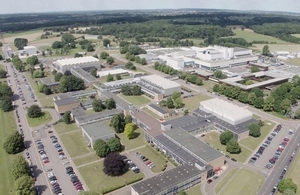Secretary of State for International Trade Liz Truss speaking at the Velvet Revolution Ball
Good evening ladies and gentlemen, Lord Mayor and Lady Mayoress. I would like to start by thanking Foreign Minister Tomáš Petříček for choosing London as the venue for this prestigious event marking the 30th anniversary of the Velvet Revolution.
As a teenager in my parents’ living room, I vividly remember watching communism collapse across Central and Eastern Europe. After more than 40 years, the dam finally cracked under the growing weight of expectation. A wave of liberation swept across the region, washing away this failed and discredited ideology.
I remember Prime Minister Margaret Thatcher visiting Gdansk cheered on by 20,000 people hoping, praying that their nightmare was coming to an end. I remember the courageous young Germans astride the Berlin Wall – that ugly scar separating the free West and the oppressed East – as they tore it down brick by brick. I remember the students who bravely took to the streets of Prague just a few days later and sparked the Velvet Revolution.
I was fortunate enough to visit your beautiful capital in the 1990s, and was struck by the feeling of hope and optimism that welcomed me. I found it everywhere; on the football terraces and in the bars. Clearly, a huge weight had been lifted. And this peaceful transition of power is a testament to the Czech people. Of course, it was Mrs Thatcher, more than almost any other Western leader, who made the philosophical, moral and economic case for freedom. Her determination to face down communism is one of the reasons why she is so revered to this day in Central and Eastern Europe.
In the wake of the Velvet Revolution, one of the first things she did was to invite President Vaclav Havel to Downing Street. And six months later, on a return trip, she helped lay the foundations on which our two countries have built the strong economic and cultural links of which we are so proud today.
I am sure President Havel took great pleasure in opening the first Summer Shakespeare Festival at Prague Castle in 1990. He was a celebrated playwright himself; during the 1970s the Orange Tree Theatre in London put on a number of his fine works in a show of solidarity with this brave campaigner for justice and freedom. In the years since 1989, Czechoslovakia and then the Czech Republic has seized the opportunities afforded by that freedom.
Helped, I like to believe, by the British expertise we made available in the early 90s through the Know-How Fund, you accomplished a very rapid transformation and have built a formidable economy.
GDP has tripled in the past 20 years and is expected to top $300 billion (USD) by 2023.
Last year trade between our two countries reached nearly £10 billion (GBP).
Compare that to 20 years ago when the figure was less than £2 billion (GBP).
And the appetite in the UK for what the Czech Republic has to offer continues to go from strength to strength. From cutting edge vehicles like Skoda’s Octavia, which can be found cruising in the fast lanes of our motorways; to your world-famous Pilsners, for which we Brits have developed a real thirst. Of course, one of the many things that we have in common is our love of a well-crafted beer. So it shouldn’t come as a surprise that we are shipping nearly one million pints of our own ale to you each year!
The Czech people have made a huge contribution to Britain. From your brave pilots who helped repel the Luftwaffe during the dark days of the Battle of Britain; to the tens of thousands of Czechs who have made the UK their home and go to work every day in our offices, hospitals and schools. And not least the Czech cardiologists, who have been making a vital contribution to the work of Great Ormond Street Hospital since 1968.
You are our friends, our colleagues, our neighbours. We value your contribution and will continue to protect your rights after we leave the EU.
The UK will also continue to work to strengthen our relationship with the other three members of the Visegrad Four: Poland, Hungary and Slovakia. Because as freedom has spread to the East, as new players emerge on the world stage we need to remake the case for free trade and free enterprise.
It is more important than ever that we stand shoulder-to-shoulder with our friends and allies to defend our way of life. That is why our shared and strong commitment to NATO will remain vital in guaranteeing our collective security. And it is why we need a rules-based trading system at the World Trade Organisation.
As the UK prepares to retake its independent seat at the WTO, I’m committed to bringing down tariffs and boosting free trade, both of which have done so much to spread prosperity across the world. In an age of growing protectionism, countries like ours have a central role to play in making the case for freedom and free markets.
We simply cannot afford to take our freedom for granted. Your bitter experience between 1938 and 1989 has shown us that. But your progress over the last 30 years has also shown the world what people can do when the shackles of oppression are removed and they are given their fundamental right to live as free individuals.
These are lessons that we must never forget.
The spirit of the Velvet Revolution must live on in our hearts.

